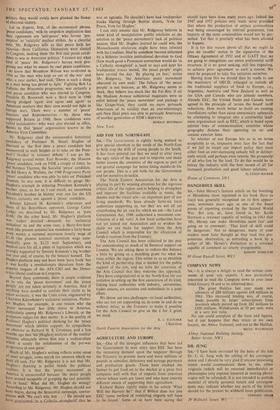AGRICULTURE AND EUROPE SIR,—One of the strongest influences that have
led the Government to seek entry into EEC has been the increasing demand upon the taxpayer through the Treasury to provide more and more millions of pounds in subsidies, deficiency and acreage payments and production grants. These have enabled the farmer to put food on to the market at a price that compares well with that of imports from countries whose labour costs are lower and who have entirely different means of supporting their agriculture.
Richard Bailey rightly states in his article 'What Will the Harvest Be?' that if Britain does not join EEC 'some method of restricting imports will have to be found.' Some of us have been saying this should have been done many years ago. Indeed the 1947 and 1957 policies only made sense provided that where the production of certain commodities was being encouraged by internal guarantees, free imports of the same commodities would not be per- mitted. Yet that is precisely what has been allowed to happen.
It is for this reason above all that we ought to give six months' notice to the signatories of the Ottawa Agreement of 1932 and of GATT that we are going to renegotiate our entire preferential tariff structure. It is no good seeking, still less expecting, to achieve prior agreement to such a course. We must be prepared to take this initiative ourselves.
Having done this we should then be ready to use the machinery of OECD, enlarged to include all the traditional suppliers of food to Europe, i.e., Argentina, Australia and New Zealand as well as the USA and Canada who are already members. Already EEC, the United States and Canada have agreed to the principle of 'across the board' tariff reductions. How much better to build on existing foundations rather than cause unnecessary upheavals by attempting to integrate into a continental land- mass organisation such as EEC, which is based upon interior fines of communication, countries whose geography dictates their operating on air and oceanic exterior lines.
So whether or not Europe lets us in on terms acceptable to us, taxpayers must face the fact that if we fail to recast our import policy they must either foot an ever-increasing subsidy bill or deliber- ately retard, and perhaps even reverse, the prosperity of all who live by the land. To do this would be to betray the industry with the best record of all for increased production and good labour relations.


































 Previous page
Previous page